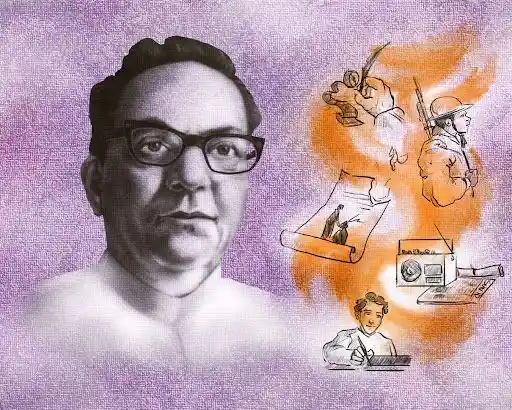Srirangam Srinivasa Rao: Voice of the Common Man
At a time when people mostly preferred reading classical and traditional mythology, a legend was born who introduced the world to contemporary problems that affected the daily life of common people.

Srirangam Srinivasa Rao. Illustration by Tarun Kumar
During the early 1900s, authentic Hindu society and its customs were losing their touch due to modernists and social reformers. Regional and vernacular language works were taking a backseat, and the middle-class society struggled the most. In response, a group of writers and poets dedicated themselves to bringing back the significance of vernacular traditions, thus beginning the progressive writer’s movement.
One such writer who introduced a completely new style and way of writing in Telugu classical poetry was Srirangam Srinivasa Rao, popularly known as Sri Sri. Born in a Telugu Brahmin family in Vishakhapatnam on April 30th, 1910, he attended schooling in Vishakhapatnam and graduated with a BA from the University of Madras in 1931. At the early stage of his career, he worked as a demonstrator at SVS college, Vizag in 1935, then he joined as a sub-editor at a local newspaper in 1938. Later, he even worked for All India Radio and the armed force. Sri Sri was considered a child prodigy as he started writing poems from the age of seven.
Sri Sri was the first Telugu Poet who shed light on contemporary issues of the common man. What made him and his work unique and memorable was how he showcased the issues that affected the daily life of a common man. His style of writing was never seen before in Telugu classical poetry, and he even moved beyond from the most commonly used traditional mythological genre to focus more on contemporary writing.
Sri Sri’s work played a major role in raising awareness amongst society. His work influenced many people, making him a poet with a reputation that no other Telugu poet had ever enjoyed before. In the 1950s and 60s, he became the voice of the common man, a representative of every middle-class individual’s struggle, anger, sorrow, and frustration.
He introduced the free verse style in Telugu poetry throughhis anthology of poems, Maha Prasthanam, which means “The Great Journey to a New World”. An Indian movie was also made based on the epic. The anthology is a compilation of poetry written between 1930 and 1940. It was published in 1950 and was considered an epic and magnum opus in modern Indian poetry. In Maha Prasthanam, Sri Sri addressed the issues of struggle, social injustice, and people who suffer from these and much more. The popularity of Maha Prasthanam gave Sri Sri the honored title of Mahakavi (The Great Poet). After the great success of the epic, Sri Sri became a household name.
Sri Sri received a National Film Award, a Nandi Award, and a Sahitya Akademi Award for his anthology, Maha Prasthanam. He also led the wave of progressive poets who formed the Progressive Writers’ Association (Abhyudaya Rachayitala Sangham, also known as Arasam).
He received tremendous honor not only for his writing but also for all other notable work that he did throughout his life. He was a member of PEN INDIA and Sahitya Academy and served as Vice President of the South Indian Film Writers’ Association, Madras. Soon, he entered the film industry as a screen and song writer.
Sri Sri claimed to be “an extremist in his poetry” and “a modernist in his politics”. The impact that he made on people in the literary and political world cannot be compared to anyone else. Injustice, struggles of people, and inequality became prominent subject in the poetry of the next era. Sri Sri’s work remains as relevant as ever till date.


